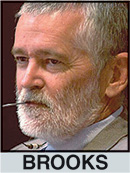OPINION: Possible reasons for Missouri’s legislative dysfunction
By PHILL BROOKS
Capitol Perspectives
 This column was inspired by a discussion with Missouri Independent reporter Rudi Keller the day after the 2022 legislative session adjourned.
This column was inspired by a discussion with Missouri Independent reporter Rudi Keller the day after the 2022 legislative session adjourned.
We reminisced about earlier years when there seemed to be a more intense focus on the specific details of public policy rather than ideology and pondered what caused the change.
Has it been the growth of a stronger ideological focus for many legislators? Or did a decline in legislative focus on policy details lead to more emphasis on ideology?
Years ago, the legislature had frequent committee meetings between the annual legislative sessions.
Without the pressure of full-chamber sessions to promptly act on pending bills, committees have more flexibility to devote hours on intensive hearings and detailed discussions about specific state issues.
Those extended sessions provided legislators, their staff and reporters with a far deeper understanding of major state issues.
Maybe if legislative debate and filibusters put more focus on policy details, it might reduce the ideological warfare that was such a major factor in this year’s session.
But I’m doubtful.
‘WARFARE OF VALUES’
The two major political parties have become so ideologically divided that the warfare of values has become a far greater factor in the legislative process.
Political campaigns have become dominated by an effort to fire up the ideological base rather than help the general public understand the complicated issues facing the state.
A decline in campaigns based on the details of public policy leads to a less informed general public from whom legislators seek electoral support.
I’m not arguing that policy details were not discussed and debated in this last legislative session.
But the long-winded ideological arguments often drowned out policy discussion.
AND GETTING WORSE
Compounding the problem is the growing ideological divide between the two parties in the legislature.
At one time, there were fiercely conservative Democrats in the Legislature and equally committed moderate Republicans to a degree that would be unimaginable today.
After Republicans took control of the Legislature in 2003, party-line votes became more common in Missouri’s General Assembly – by members of both parties.
My database of major, news-worthy roll-call votes, which goes back to 1995, shows a dramatic increase in party-line votes after Republicans took control of both chambers in 2003.
In every year since GOP control, on the key issues of my database, Republicans voted with a uniformity approaching or exceeding 90 percent each year.
A similar conformity was demonstrated by Democratic votes, but far from the magnitude of Republicans.
NOT A SURPRISE
For long-time Missouri statehouse reporters, these numbers are not a surprise. For some time, a growing partisan divide on public policy issues in the Legislature has been become increasingly apparent.
What has caused Democrats and Republicans to become more in lock-step with their party colleagues?
Is it term limits? Does it reflect campaigns that focus on ideological rather than substantive policy issues? Is it a reflection of a process that has less focus on the complicated details of public policy? Is there a stronger pressure on legislators to vote the party line?
Or is it more a reflection of the decline in the number of moderate legislators in both parties?
Most likely, I suspect, it is a combination of those factors.
(Phill Brooks has been a Missouri statehouse reporter since 1970, making him dean of the statehouse press corps. He is the statehouse correspondent for KMOX Radio, director of Missouri Digital News and an emeritus faculty member of the Missouri School of Journalism. He has covered every governor since the late Warren Hearnes.)


Leave a Reply